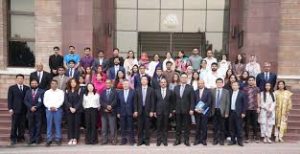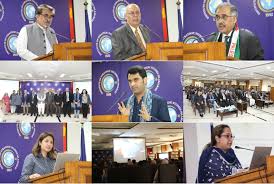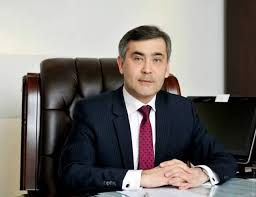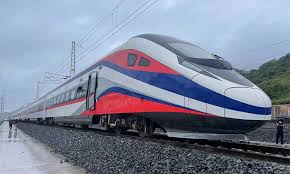Xi’s “two-wheel” diplomacy gives fresh impetus to China-Greece ties
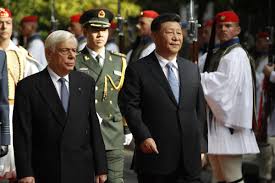
Athens: Chinese President Xi Jinping toured the Acropolis Museum on Tuesday before he wrapped up his three-day state visit to Greece. A day before, he visited the Piraeus Port following separate talks with Greek President Prokopis Pavlopoulos and Prime Minister Kyriakos Mitsotakis.
The two arrangements epitomize what the Chinese leader has described as the “two wheels” to drive bilateral relations, namely practical cooperation and inter-civilizational dialogue.
Thanks to their concerted two-pronged efforts, the two ancient civilizations are forging an increasingly fruitful partnership and solid friendship in the new era.
Accompanied by Pavlopoulos and his wife, Xi and his wife, Peng Liyuan, visited the Acropolis Museum in Athens on Tuesday morning. The couples listened attentively to the interpreter. Xi stopped and asked questions from time to time.
The Chinese president said the tour left him a beautiful and memorable impression, and deepened his understanding of ancient Greek civilization.
He said he felt the impact of history and further realized that China and Greece, as two ancient civilizations, have much in common.
Stella Atlamazoglou, public relations director of Athens-based Sino-Hellenic Culture Promotion Company, said that she was impressed by Xi’s emphasis on what Greek and Chinese civilizations have in common.
“Undoubtedly, these are two countries with enormous cultural richness. The two countries meet in the middle of the Silk Road and join forces,” said Atlamazoglou.
In the eyes of Pavlopoulos, the ancient splendid and great civilizations of Greece and China have linked the two peoples closely.
He thanked Xi on behalf of the Greek people for understanding and respecting the Greek civilization and for seeing Greece as a bridge between Eastern and Western civilizations.
Vasilis Trigkas, a Greek research fellow with the Belt and Road Strategy Institute of Tsinghua University, said that the two countries’ joint efforts to promote their civilizations internationally could contribute significantly to their soft power.
Yet the significance goes beyond their borders. China, noted the researcher, has been championing dialogue of civilizations to promote peace and cooperation between the West and the East.
The Piraeus Port, some 10 km southwest of Athens, was in the throes of a financial crisis until a subsidiary of China Ocean Shipping Company, also known as COSCO, started managing the port’s container terminals in 2009. In 2016, COSCO acquired a majority stake in the port and formally took over its management and operation.
So far, the project has created jobs for over 10,000 local people directly and indirectly, and turned the struggling Piraeus Port into the largest port in the Mediterranean region and one of the fastest-growing container terminals in the world.
When Xi and Mitsotakis visited the port on Monday, representatives of local staff talked with Xi about their work and life, and expressed heartfelt gratitude to COSCO for providing them with job opportunities in the most difficult times during the Greek debt crisis.
Thanks to the Chinese company, they now enjoy stable jobs and a happy life, the Greek employees told Xi, adding that they feel very proud and have full confidence in the port’s future.
Delighted to visit the port, Xi said that seeing is believing, and that he has seen here that the China-proposed Belt and Road Initiative (BRI) is not a slogan or tale, but a successful practice and brilliant reality.
For his part, Mitsotakis said that facts have proved that the Piraeus Port project is mutually beneficial, and has strongly boosted the recovery of the Greek economy and social development.
From the project, said the prime minister, the Greek side has come to a deep understanding of the true meaning of “friends”.
Giorgos Patoulis, regional governor of Attica, where the Piraeus Port is located, said that in addition to the project, the regional government is now eyeing more cooperation.
“We believe that we can cooperate in several fields related to energy, electromobility … but also in culture, in health tourism, to connect the two civilizations of the East and West,” he said.
With Xi’s state visit, China-Greece relations have embarked on a new journey toward a more promising future on the “two wheels” of practical cooperation and inter-civilizational dialogue, said Greek observers.
George Vernicos, president of the Economic and Social Council of Greece, said Xi’s visit meant that the comprehensive strategic partnership between Greece and China has been further strengthened.
“The relations are linked traditionally to the deep friendship of the two peoples, their ancient civilizations, the shipping industry, and the commercial and tourist relations that we have today,” he said.
Noting that the two sides signed a series of agreements covering fields like banking, energy, agriculture and tourism, Vernicos said “all these mark a promising future for robust and glorious cooperation.”
“We have every reason to be optimistic,” he said. “The closer this cooperation becomes, the better it benefits the two peoples.”
Loukas Tsoukalis, president of the Hellenic Foundation for European and Foreign Policy, acknowledged that China and Greece “are countries that are separated by distance, very different in size and have had very different political and economic trajectories in recent history.”
“Yet our relations are excellent and take the form of a close exchange of goods, services, people, capital and culture,” he said.
Speaking of specific cooperation areas, Trigkas, the Tsinghua researcher, said China’s success in the field of technological innovation is remarkably interesting for Greece.
“Our country has an excellent scientific base while China wishes to internationalize its technological companies,” he said.
“This complementarity could attract more research centers of Chinese companies in Greece, contributing substantially to the development of the Greek economy,” he added. Enditem

